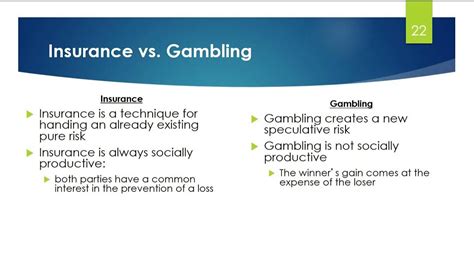Have you ever pondered what differentiates gambling from insurance? At first glance, both involve money and risk: gamblers bet on uncertain outcomes hoping for large payouts, while individuals purchase insurance to mitigate potential financial losses from unforeseen events. Yet, one is often stigmatized, labeled as ‘stupid,’ ‘addictive,’ and is heavily regulated or outlawed in many jurisdictions, while the other is a staple of modern personal and business finance, mandated in many contexts, and seen as a prudent measure. This mystery is worth unraveling because it reveals much about societal values and economic functionality.
Let’s start by considering the nature of each activity. Gambling involves placing money on an uncertain outcome, generally framed around stochastic events like card games, sporting events, or lotteries. The allure is in the possibility of an outsized reward for a relatively small stake. However, as many critics point out, the odds are usually stacked against the gambler. The house always wins, ultimately ensuring that the casino or bookmaker profits over time. Insurance, on the other hand, is a way to mitigate risk. When you pay an insurance premium, you’re essentially transferring the financial risk of an adverse event (such as an accident, illness, or death) to the insurer. In return, the insurer agrees to compensate you if that event occurs.
Fundamentally, both activities involve an element of risk and a transfer of money. But the key difference lies in their purpose and structure. Gambling inherently adds risk to a person’s life by enticing them to bet money on outcomes that are designed to favor the house. This risk is generally recreational, where the participant stands to gain or lose based purely on chance. The issues intensify when considering people susceptible to gambling addiction, where the act provides a compulsive, potentially destructive thrill, often leading to financial ruin.
Insurance, by contrast, is designed to reduce risk. When you take out an insurance policy, you’re seeking protection from financial instability. This is why mandatory insurance exists for vehicles and homes; it’s a way to ensure that people can recover from catastrophic losses without being financially devastated. For instance, mandatory car insurance covers liabilities like injury or damage to other parties’ property, ensuring that victims are compensated without depending on the at-fault driver’s financial capability. The ethical stance here is logical: reducing individual risk through shared risk pools fosters greater social stability.
Consider the case of health insurance, particularly in countries where healthcare isn’t universally provided by the state. Critics here argue that what is called ‘insurance’ isn’t truly insurance because it covers predictable and often routine medical expenses rather than rare, catastrophic events. The distinction is crucial; traditional insurance deals with low-probability, high-impact events. The high frequency of medical claims diminishes the role of ‘risk’ in health insurance, pushing it towards a form of managed care or a subscription service that offsets high healthcare costs over time.
Moreover, ethical lines are often blurred when financial products mimic insurance but function as gambling tools. Credit Default Swaps (CDS), infamous during the 2008 financial crisis, are a case in point. These financial derivatives allowed investors to ‘insure’ debt they didn’t own, essentially betting on its default. The cascading failures of these swaps illustrate what happens when markets treat products designed to mitigate risk as speculative instruments. This reaffirms that the integrity of insurance as a risk management tool depends on adhering to principles of insurable interest and financial prudence.
Let’s examine how the principle of utility plays into this comparison. Utility theory, which originated in economics, helps clarify why people might prefer one over the other. Utility isn’t just about monetary value; it incorporates subjective satisfaction or happiness derived from an action. For instance, gambling might have a poor expected monetary return, but the entertainment value—the
thrill of the bet
can create positive utility for the gambler. Conversely, insurance provides peace of mind, a significant source of utility for those worried about potential financial disasters. This reduction in stress and uncertainty has its own substantial value.
On a societal level, insurance supports economic stability and growth by allowing individuals and businesses to operate without the paralyzing fear of catastrophic losses. Mortgages, for instance, allow people to buy homes they couldn’t afford upfront, with insurance ensuring those investments are protected. This distinction ties into broader economic themes where risk is collectively shared to benefit individual participants and the system as a whole. By reducing the variance of potential outcomes, insurance enables planning and investment, essential elements for a stable and prosperous economy.
There is, however, an ongoing debate about the ethics of both systems in terms of how they handle risk and reward. Some argue that both could be seen as two sides of the same coin—mechanisms to cope with uncertainty in different ways. Yet, framing insurance as ‘ethical gambling’ might be an oversimplification. The intention behind and societal impact of these activities vary greatly. Gambling can lead to severe personal and social consequences, including addiction and financial ruin, while insurance, when properly managed, spreads risk across a large pool, providing a safety net that enables individuals to rebuild after a misfortune.
In conclusion, both gambling and insurance are deeply ingrained in our socio-economic fabric, each serving different roles and affecting individuals and society in varied ways. Recognizing and respecting the differences between them helps in fostering ethical and practical applications. While one might offer fleeting excitement with the lure of a windfall, the other provides reassurance and stability, though at the cost of a regular outlay. Thus, while they share some structural similarities, their divergent purposes and impacts underscore why society generally views insurance as a judicious, necessary safeguard, and gambling as a potentially hazardous pastime.


Leave a Reply